Sunday, 20 August 2006
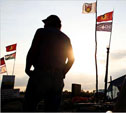 [UPDATED AUGUST 23]. Along with everything else this waning summer, the free and democratic people in Canada’s most populous province of Ontario must still worry about what the influential political newsletter Inside Queen’s Park has just called a "dangerously festering dispute," between the Six Nations Iroquois of the Grand River and assorted governments and non-aboriginal peoples of Canada. Ostensibly, this is all about native land claims in the Caledonia area, southwest of Toronto. But an increasingly thorny intervention by the courts has now brought "a huge challenge to the political management of the dispute." It has also sharpened deep old questions about the diversity of the Canadian future — and hinted at some initial answers that seem quite sad. [UPDATED AUGUST 23]. Along with everything else this waning summer, the free and democratic people in Canada’s most populous province of Ontario must still worry about what the influential political newsletter Inside Queen’s Park has just called a "dangerously festering dispute," between the Six Nations Iroquois of the Grand River and assorted governments and non-aboriginal peoples of Canada. Ostensibly, this is all about native land claims in the Caledonia area, southwest of Toronto. But an increasingly thorny intervention by the courts has now brought "a huge challenge to the political management of the dispute." It has also sharpened deep old questions about the diversity of the Canadian future — and hinted at some initial answers that seem quite sad.
The Straight Goods from Ms. Hill and Ms. McQuaig ...
 Two of the more interesting recent Internet reports on the Caledonia dispute appear in the current Straight Goods e-magazine, published in the rural-small-urban region of the Ottawa Valley, in eastern Ontario. Two of the more interesting recent Internet reports on the Caledonia dispute appear in the current Straight Goods e-magazine, published in the rural-small-urban region of the Ottawa Valley, in eastern Ontario.
One is by Hazel Hill — "a clan mother and one of the approved, designated spokespersons for the Six Nations activist team at the site" of the disputed land claim (which has been occupied by the Six Nations since late February). The other is by Linda McQuaig — "an award-winning journalist and a columnist with the Toronto Star in which this column originally appeared" (and also the author of, e.g., All You Can Eat: Greed, Lust and the New Capitalism and It's the Crude, Dude: War, Big Oil, and the Fight for the Planet.)
Both pieces are written from a standpoint of broad support for the cause of the Six Nations activists at Caledonia, whatever that may exactly prove to be. Yet there has been much casual and other evidence over the past several months to suggest that this standpoint is not finally shared by the democratic majority of non-aboriginal Canadians at large, or by those currently resident in Ontario, and especially by those who reside in the vicinity of Caledonia itself.
At the same time, a formal poll this past spring confirmed that broad support for the Six Nations is shared by a majority of aboriginal Canadians (such as Ms. Hill). Especially other Canadians with some appreciation of the Six Nations’ unique regional history (such as Ms. McQuaig) take a similar view. Guessing from an assortment of informal polling and related evidence, perhaps as many as a third or so of the non-aboriginal people of Canada may support the Six Nations Caledonia protesters, in one sense or another (but almost certainly no more than that, at best?).
Judge Marshall’s latest decision ...
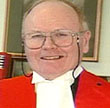 Back during the earliest phases of the dispute this past spring, Ontario Superior Court Judge T. David Marshall ruled that the occupation of the disputed land-claim site by Six Nations activists was illegal, and should be brought to an end. It was a failed Ontario Provincial Police (OPP) attempt to enforce this injunction that first brought the issue into mass media headlines. Back during the earliest phases of the dispute this past spring, Ontario Superior Court Judge T. David Marshall ruled that the occupation of the disputed land-claim site by Six Nations activists was illegal, and should be brought to an end. It was a failed Ontario Provincial Police (OPP) attempt to enforce this injunction that first brought the issue into mass media headlines.
Premier Dalton McGuinty’s present duly elected Liberal provincial government — remembering how the aboriginal activist Dudley George was tragically shot to death by the OPP in a somewhat related incident in another part of the province, about a decade ago now — resolved to address the dispute peacefully, through negotiation. And the OPP has subsequently followed suit.
Judge Marshall, however, has continued to press for the enforcement of his original injunction. He has most recently ordered that all negotiations between the Six Nations and the provincial (and federal) governments cease, until the illegal occupation of the disputed land has ended. The provincial government is nonetheless appealing his decision to a higher court. And at least on the most optimistic scenario, negotiations could resume shortly. [And now, optimistically enough, as of August 23, the Ontario Court of Appeal has in fact determined that the "negotiations, slated to resume today, can go ahead without fear that any party to them — the federal and Ontario governments, the elected chiefs of the Six Nations or the traditional band council — will be found in contempt of court."]
But, with the occupation of the land claim site already into its sixth month, there has also been significant local social and economic disruption for non-aboriginal peoples living in the Caledonia area. A group known as the Caledonia Citizens Alliance has arisen. It has intermittently clashed with the Six Nations occupiers — most recently within the past several days, as recounted by Ms. Hill in her Straight Goods piece.
How important is the rule of law ... ?
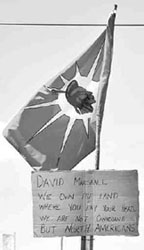 Ms. McQuaig’s piece is headlined "Odd that judge wants to stop the promising negotiations already taking place ... " Yet others equally see Judge Marshall as speaking for the democratic majority — locally, provincially, and nationally (or federally if you live in Quebec) — which has, so to speak, lost patience with the aggressive and sometimes rude and even contemptuous Six Nations activists (who are, again, breaking the law, or indulging in "civil disobedience," in their current occupation of the disputed site). Ms. McQuaig’s piece is headlined "Odd that judge wants to stop the promising negotiations already taking place ... " Yet others equally see Judge Marshall as speaking for the democratic majority — locally, provincially, and nationally (or federally if you live in Quebec) — which has, so to speak, lost patience with the aggressive and sometimes rude and even contemptuous Six Nations activists (who are, again, breaking the law, or indulging in "civil disobedience," in their current occupation of the disputed site).
The provincial Conservative opposition leader, the aptly named Mr. John Tory, has similarly urged Premier McGuinty "to use the time provided by the decision to appeal Justice David Marshall’s recent court ruling to achieve a restoration of the rule of law in Caledonia and to better protect the safety of people on all sides of the dispute ... This situation has gone on for months and, in my view, it is reaching another crisis point ... "
On the other side of the barricades, the Hamilton Spectator — in the Ontario big city closest to Caledonia — has recently published a photograph of a Six Nations "warrior flag and message on the disputed land." The message, roughly scrawled on a placard, reads: "David Marshall — We own the land where you lay your head. We are not Canadians but North Americans."
However apt this may or may not be, on one version of native North American history, there is, conveniently enough, no such country as North America today, that enforces any laws "to better protect the safety of people on all sides." So from this point of view — which does seem broadly endorsed by at least the most mindless identity ideologues among the aboriginal activists at Caledonia — the rightly aggrieved Six Nations are ultimately above the law that everyone else in the early 21st century must obey. At this point it is not too hard to see why Inside Queen’s Park is talking about a "dangerously festering dispute." (And also perhaps, why the New York Times has recently given the issue some wider attention in the North American heartland today, under the headline "6 Native Nations, and None Have a Word for ‘Suburbia’").
Questions that will not go away ... probably ?
 There are various good reasons for being sad about this sequence of events, and where it seems to have landed as the 2006 summer holiday season winds down — and the "prosy old province of Ontario" gets ready to return to serious business in the bracing fall breezes north of the lakes. There are various good reasons for being sad about this sequence of events, and where it seems to have landed as the 2006 summer holiday season winds down — and the "prosy old province of Ontario" gets ready to return to serious business in the bracing fall breezes north of the lakes.
Hopefully, negotiations among the Six Nations and representatives of assorted Canadian governments will resume soon enough, as the appeal of Judge Marshall’s latest decision wends its way through various legal labyrinths. (On August 22 provincial lawyers will go to court to "argue for a stay of a decision by Superior Court Justice David Marshall, which ordered all parties to halt talks until aboriginal protesters end their almost six-month occupation of the Douglas Creek Estates housing development site. If the court rules in favour of the government, negotiations would resume until the appeal is heard.")
 More exactly, as Inside Queen’s Park has put it, the "McGuinty government ... tried to finesse the entire dispute in mid-June by buying out the developers of Douglas Creek Estates to put the issue into political escrow." Continuing negotiation over the ultimate fate of the land in this context probably does remain the most sensible and peaceful way of bringing the whole dispute to some suitably kinder and gentler resolution not too far down the road. More exactly, as Inside Queen’s Park has put it, the "McGuinty government ... tried to finesse the entire dispute in mid-June by buying out the developers of Douglas Creek Estates to put the issue into political escrow." Continuing negotiation over the ultimate fate of the land in this context probably does remain the most sensible and peaceful way of bringing the whole dispute to some suitably kinder and gentler resolution not too far down the road.
[And now again, as of August 23, as noted above, negotiation to this end can apparently go ahead. The finer legal points are inevitably somewhat complex. A provincial government lawyer has argued that the "aboriginal protesters occupying a disputed land development site on the edge of Caledonia ‘are not there unlawfully’" — since the province has now purchased the disputed land from the private owners on whose behalf Judge Marshall’s original injunction was issued. For a more complete summary, see James Rusk’s admirable report in the August 23 Globe and Mail. Strictly speaking, the Court will not rule on a "stay of Judge Marshall's order" until this Friday, August 25. But the court appears to have accepted the point that the provincial government's purchase of the land has cleared a fresh legal path.]
Yet even if this sort of legal plot does finally work out, as the McGuinty government would like, there remains a growing tension between aboriginal activists and many non-aboriginal residents in the Caledonia area, over the continuing Six Nations occupation of the disputed land-claim site. [And this is a matter that cannot be resolved through legal technicalities alone.]
By, as it were, continuing to speak up on behalf of both at least his understanding of the "rule of law" and today’s democratic majority in the Caledonia area (and all wider slices of geography up to Canada at large), Judge Marshall has raised some fundamental questions that are probably not going to go away. And these questions are not just about aboriginal policy, but even about the future of Canada itself.
Where have the last 40 years gone ... ?
 In this context, the saddest reason for being sad about Caledonia is the increasingly harsh light it is casting on just how little progress has really been made in the growth of the new diverse and independent Canadian democracy that began in the 1960s — when whatever it is that Canada is supposed to be nowadays finally started to take shape. (With the proclamation of the present independent Canadian flag say, early in 1965, or even in 1960 when "aboriginal Canadians were no longer required to give up their treaty rights and renounce their status under the Indian Act in order to ... vote" in federal elections). In this context, the saddest reason for being sad about Caledonia is the increasingly harsh light it is casting on just how little progress has really been made in the growth of the new diverse and independent Canadian democracy that began in the 1960s — when whatever it is that Canada is supposed to be nowadays finally started to take shape. (With the proclamation of the present independent Canadian flag say, early in 1965, or even in 1960 when "aboriginal Canadians were no longer required to give up their treaty rights and renounce their status under the Indian Act in order to ... vote" in federal elections).
This is not just a matter of being sad that, when the eminent old Toronto radio station CFRB asked its listeners "Do you support the Six Nations protest?," only 37% answered Yes. Or of being sad that so few non-aboriginal Canadians know much at all about the rather distinguished history of the Six Nations Iroquois — in Ontario, Canada, and even North America at large. Or even of being sad about all the bitter accusations of "racism," from all sides, in what is sometimes said to be one of the most culturally diverse regions of the global village today.
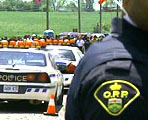 The saddest part of it all is that, even among those who do support the Six Nations protest, the hard work of trying to build a new and better, altogether independent, "free and democratic society" in Canada over the past four decades — at endless meetings of federal and provincial governments and even aboriginal leaders, leading to a new Constitution Act 1982, with a Canadian Charter of Rights and Freedoms and formal recognition of the "existing aboriginal and treaty rights of the aboriginal peoples of Canada" — is proving to have had a lamentably scant impact down on the ground where most Canadians live. The saddest part of it all is that, even among those who do support the Six Nations protest, the hard work of trying to build a new and better, altogether independent, "free and democratic society" in Canada over the past four decades — at endless meetings of federal and provincial governments and even aboriginal leaders, leading to a new Constitution Act 1982, with a Canadian Charter of Rights and Freedoms and formal recognition of the "existing aboriginal and treaty rights of the aboriginal peoples of Canada" — is proving to have had a lamentably scant impact down on the ground where most Canadians live.
As just one case in point, both the otherwise interesting and nicely crafted recent Straight Goods articles by Ms. Hill and Ms. McQuaig are talking as if Canada today is still essentially the same old first self-governing dominion of the British empire that it was 100 years ago. To their everlasting credit, they do remember what happened to the Six Nations Iroquois in the late 18th century. But they almost seem to have forgotten everything that has happened in Canada since the 1960s began. (And that has to make you wonder, a little at least, just what is going to happen to Canada over the next 40 years?)
Who else wears "the Crown" in Canada today if it isn’t the Canadian people ... ?
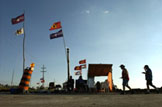 What both Ms. Hill and Ms. McQuaig do understand is that in the late 18th century a grateful British Crown granted a vast tract of land on either side of the Grand River in what is now southwestern Ontario, to loyal Iroquois who fought for the King in the American War of Independence. What both Ms. Hill and Ms. McQuaig do understand is that in the late 18th century a grateful British Crown granted a vast tract of land on either side of the Grand River in what is now southwestern Ontario, to loyal Iroquois who fought for the King in the American War of Independence.
Nowadays — for a bewildering assortment of complex commercial, economic, historical, legal, political, and other reasons, involving both non-aboriginal and aboriginal peoples alike — the Six Nations reserve on the Grand River is much, much smaller than the original grant. For another complex assortment of reasons surrounding the present moment in the story of Canada (and the world at large, no doubt), the Six Nations seem to have decided that it is time to get something closer to the original grant back.
In Ms. Hill’s view, the original grant came from "the Crown." And that is still whom or what or whatever the Six Nations are or ought to be dealing with in their efforts to recover their subsequently lost lands. "This is a matter," Ms. Hill tries to stress, "between Six Nations and the Crown, not the Caledonia Citizens Alliance." And one of her big frustrations with the sad way in which the events of the past six months have unfolded is that: "It doesn't seem to matter how often we try to remind Caledonia and the rest of the world that this is NOT a Six Nations vs. Caledonia problem but in FACT is a matter between Six Nations and the Crown."
Yet, as a simple matter of still more practical fact, the Crown in Canada in 2006 is clearly not the British Crown that granted the Six Nations the Grand River lands in the late 18th century. Just to start with, Canada finally did altogether "patriate" its 19th century "British" constitution from the United Kingdom in the Constitution Act 1982 — a saga in which Canadian aboriginal leaders themselves played an important role. Elizabeth II still formally remains the "Queen of Canada," for the time being at any rate. But no one in their right mind nowadays would suggest that she (or her resident Canadian representative, the excellent Mme Michaelle Jean) is the person who should be resolving the current disputed Six Nations land claim in Caledonia. You similarly cannot properly say, on the assumptions of Canada’s inherited British or "Westminister" parliamentary tradition itself, that either Ontario Premier Dalton McGuinty or Canadian Prime Minister Stephen Harper wears the Crown today (even if this is too often closer to the most practical truth in the early 21st century than it ought to be).
 In the end, when you look at how the present Canadian political system actually works, it can be no other than the same sovereign Canadian people who vote in federal and provincial elections who finally wear the Crown, at least in the altogether independent, free and democratic Canada that is supposed to have set down fresh constitutional roots since the 1960s. The Canadian people may continue, for the moment, to acknowledge some vague traditional symbolism attached to Queen Elizabeth II. But, whatever this may mean today, it cannot possibly any longer mean what it meant 100 or even 50 or 60 years ago. (The Harper Conservative government in Ottawa did, as some have stressed, somewhat unusually refer to the Queen’s 80th birthday once at the start of its first throne speech earlier this year. But then even it went on to allude to the ultimate real-world power of "the Canadian people" four times.) In the end, when you look at how the present Canadian political system actually works, it can be no other than the same sovereign Canadian people who vote in federal and provincial elections who finally wear the Crown, at least in the altogether independent, free and democratic Canada that is supposed to have set down fresh constitutional roots since the 1960s. The Canadian people may continue, for the moment, to acknowledge some vague traditional symbolism attached to Queen Elizabeth II. But, whatever this may mean today, it cannot possibly any longer mean what it meant 100 or even 50 or 60 years ago. (The Harper Conservative government in Ottawa did, as some have stressed, somewhat unusually refer to the Queen’s 80th birthday once at the start of its first throne speech earlier this year. But then even it went on to allude to the ultimate real-world power of "the Canadian people" four times.)
It is no doubt true enough that the Caledonia Citizens Association cannot seriously claim to speak for the Canadian people itself. Yet it does seem to reflect something of a wider unease about what has gone on at Caledonia over the past six months, among some kind of democratic majority of the Canadian people. And there does seem a sense in which part of what most deeply frustrates Ms. Hill and her fellow Six Nations activists is the growing new political fact that if they do finally want to resolve the issues that ultimately lie behind their disputed land claim, they eventually will have to deal with the Canadian people, one way or another. Thanks to the continuing just exertions of the aboriginal activists themselves, the aboriginal issue in Canada that has been lingering provocatively ever since the first failed Trudeau "White Paper" on the subject in 1969 now does seem to be very close to this kind of ultimate crisis point.
And what does Ms. McQuaig think ... ?
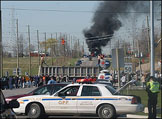 Ms. McQuaig’s analysis of the situation is in some ways surprisingly similar to Ms. Hill’s. She does allude to "our Constitution Act of 1982" in which the existing aboriginal and treaty rights of the aboriginal peoples of Canada "are recognized." But she does not link this development with the parallel rise of an altogether independent Canada with its own Charter of Rights and Freedoms for all the Canadian people — aboriginal and non-aboriginal alike. Ms. McQuaig’s analysis of the situation is in some ways surprisingly similar to Ms. Hill’s. She does allude to "our Constitution Act of 1982" in which the existing aboriginal and treaty rights of the aboriginal peoples of Canada "are recognized." But she does not link this development with the parallel rise of an altogether independent Canada with its own Charter of Rights and Freedoms for all the Canadian people — aboriginal and non-aboriginal alike.
Ms. McQuaig notes that "back in the 1770s, the Six Nations native band was a big help to British forces fighting in the American Revolution. That's why, in 1784, the British Crown expressed its gratitude by awarding the Six Nations a strip of land along the Grand River ... The Six Nations played a historic role helping the British, thereby contributing to the survival in North America of a British entity, which became Canada ... The British established dominion over this land, so British-style courts are the law here today."
But where are Canada and the Canadian people today in all this? Surely Canada in the year 2006 is no longer an essentially "British" place. What has Canadian political history over the past half-century been about, if it has not been about the rise of a new bilingual and multicultural Canadian democracy, that includes and indeed even starts with the constitutionally recognized "first nations" of the "aboriginal peoples of Canada." This Canadian democracy is a full-fledged independent member of the United Nations in its own right. And it has now established its own "dominion over this land" — on behalf of all the diverse Canadian people, anglophone and francophone, of whatever cultural heritage, and (again) aboriginal and non-aboriginal alike?
Ms. McQuaig ends her piece with three questions: "So why can't the native protestors just do what the judge has ordered them to do — vacate the disputed land until the legitimate owner is determined? ... They respond with an intriguing counter-question: Why don't we Canadians do the same — vacate the land we occupy until the legitimate owner is determined? ... Something wrong with that idea?" Yes, there is quite a lot wrong with this idea, of course. Just to start with, it makes the quite bizarre presumption that the entire modern history of Canada over the past 400 years — and yet again involving aboriginal and non-aboriginal peoples alike — simply does not exist. Which is surely a kind of cultural genocide in its own right?
Will the Canadian people today ever realize that "the Indian and his culture were fundamental to the growth of Canadian institutions" .. ?
 Perhaps the most altogether sad thing about all of this is not just that, under present Canadian law, the Six Nations of the Grand River, like all other "aboriginal peoples of Canada," are indeed Canadians themselves — no matter how many placards saying otherwise some of them may hold up for the TV cameras and the newspaper photographers. Perhaps the most altogether sad thing about all of this is not just that, under present Canadian law, the Six Nations of the Grand River, like all other "aboriginal peoples of Canada," are indeed Canadians themselves — no matter how many placards saying otherwise some of them may hold up for the TV cameras and the newspaper photographers.
In fact, the aboriginal peoples of Canada actually are, in a quite real and already nicely documented historical sense, the founding first nations of the modern Canadian people. "Canada" itself is an aboriginal and even what at least archaeologists call an "Iroquoian" word. (Where the Six Nations of the Grand River are one of various historic and surviving Iroquoian-speaking peoples of North America — some of whom even helped guide the first transcontinental odyssey of the modern Canadian resource economy all the way to the Pacific Ocean.)
More exactly again, as long ago as 1930 the still towering modern Canadian historian Harold Innis wrote in the conclusion to his now classic book on The Fur Trade in Canada: An Introduction to Canadian Economic History — "We have not yet realized that the Indian and his culture were fundamental to the growth of Canadian institutions."
Some three-quarters of a century later, it would seem, aboriginal and especially non-aboriginal Canadians are alas still some very great distance away from any such realization. And yet it is as deep a historical truth as such things can get. It would probably be easier to deal with the Six Nations land-claim dispute at Caledonia in 2006 if this kind of quite real deep truth about the past were the point of departure for our current debates. And the most altogether sad thing about Caledonia, Ontario today is the depressing clarity with which it seems to be showing that this remains a goal for the much more remote and distant future at best. (If of course Canada itself can last that long — as we are bound to say it can. Like all aboriginal words, on the most optimistic hypothesis for all sides, it started when time began and will probably go on forever.)
Randall White is the author of a number of books, including Ontario 1610-1985: A Political and Economic History, and Ontario Since 1985. Only registered users can write comments.
Please login or register. Powered by AkoComment 1.0 beta 2!
|
